
Jorge Leal Amado de Faria was a Brazilian writer of the modernist school. He remains the best known of modern Brazilian writers, with his work having been translated into some 49 languages and popularized in film, including Dona Flor and Her Two Husbands in 1976. His work reflects the image of a Mestiço Brazil and is marked by religious syncretism. He depicted a cheerful and optimistic country that was beset, at the same time, with deep social and economic differences.

Cacau is Brazilian Social Realism novel written by Jorge Amado.

Sweat is a Brazilian Modernist novel. It was written by Jorge Amado in 1934. It has yet to be translated into English.
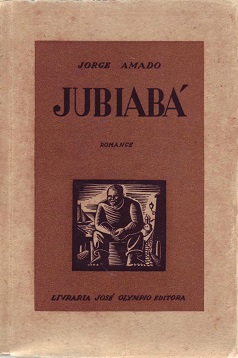
Jubiabá is a Brazilian modernist novel written by Jorge Amado in 1935. It earned Amado an international reputation, being hailed by Albert Camus as “a magnificent and haunting” book.

Captains of the Sands is a Brazilian novel written by Jorge Amado in 1937.

The Violent Land is a Brazilian Modernist novel written by Jorge Amado in 1943 and published in English in 1945. It describes the battles to develop cacao plantations in the forests of the Bahia state of Brazil. Amado wrote that "No other of my books.. . is as dear to me as The Violent Land, in it lie my roots; it is from the blood from which I was created; it contains the gunfire that resounded during my early infancy", and suggested that the novel belongs to a distinct Brazilian "literature of cacao". By 1965, the book had been adapted as a film, as well as for the stage, television and radio.
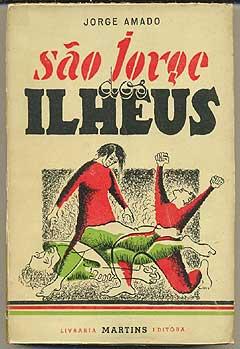
The Golden Harvest is a Brazilian Modernist novel. It was written by Jorge Amado from 1942–44, published in Portuguese in 1944 and in English in 1992.
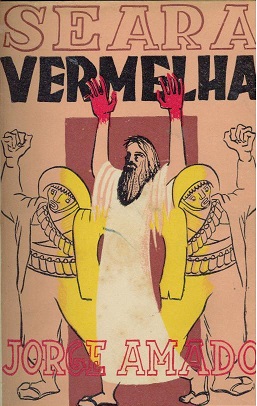
Red Field is a Brazilian Modernist novel. It was written by Jorge Amado. It has not been published in English.
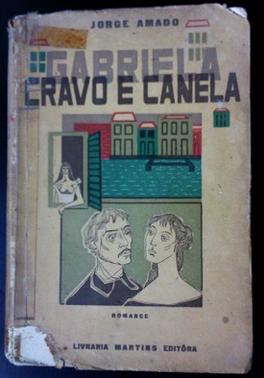
Gabriela, Clove and Cinnamon is a Brazilian modernist novel by Jorge Amado, originally published in 1958 and later published in English in 1962. It is widely considered one of Amado's finest works. A film adaptation, Gabriela, was released in 1983.

Shepherds of the Night is a Brazilian novel. It was written by Jorge Amado in 1964 and published in English in 1967.

Tent of Miracles is a Brazilian Modernist novel. It was written by Jorge Amado in 1967 and published the following year. It was later adapted to a 1977 Cinema Novo film by director/screenplay writer Nelson Pereira dos Santos.

Tereza Batista: Home from the Wars is a Brazilian modernist novel. It was written by Jorge Amado in 1972 and was published in English in 1975, with a translation by Barbara Shelby.

Pen, Sword, Camisole is a 1978 Modernist novel by Brazilian writer Jorge Amado. It was published in English in 1985, with a translation by Helen R. Lane.

The Discovery of America by the Turks is a Brazilian Modernist novel. It was written by Jorge Amado in 1994 but not published in English until 2012. Amado tells how, in 1991, he was approached by an organization in Italy to write a story to celebrate the fifth centennial of the discovery of the American continent. This would be published in a book, together with stories by Norman Mailer and Carlos Fuentes, which would be handed out to passengers flying between Italy and Central, North and South America in 1992, the year of the fifth centennial. Amado submitted The Discovery of America by the Turks but the Italian book was never published, leaving Amado free to publish the 77-page story as a separate volume.
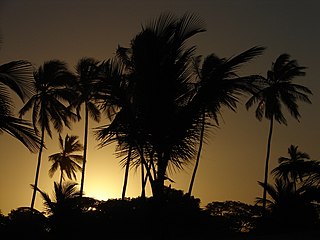
Ilhéus is a major city located in the southern coastal region of Bahia, Brazil, 211 km south of Salvador, the state's capital. The city was founded in 1534 as Vila de São Jorge dos Ilhéus and is known as one of the most important tourism centers of the northeast of Brazil.
Zélia Gattai Amado de Faria was a Brazilian photographer, memoirist, novelist and author of children's literature, as well as a member of the Brazilian Academy of Letters. Gattai wrote 14 different literary works, including children's books and her own personal memoirs have been widely published.

The Contestado War, broadly speaking, was a guerrilla war for land between settlers and landowners, the latter supported by the Brazilian state's police and military forces, that lasted from October 1912 to August 1916.

The Devil to Pay in the Backlands is a novel published in 1956 by the Brazilian writer João Guimarães Rosa.

Sharpe's Escape is the twenty-third historical novel in the Richard Sharpe series by Bernard Cornwell, published in 2004. Sharpe is embroiled in the British retreat through Portugal in 1810 from the defence of the ridge at Bussaco to the Lines of Torres Vedras, where the French offensive is successfully halted.

Events in the year 1944 in Brazil.



















